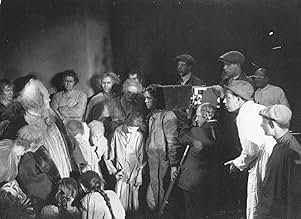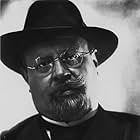IMDb RATING
8.1/10
17K
YOUR RATING
The demon Mephisto wagers with God that he can corrupt a mortal man's soul.The demon Mephisto wagers with God that he can corrupt a mortal man's soul.The demon Mephisto wagers with God that he can corrupt a mortal man's soul.
- Awards
- 3 wins total
Gösta Ekman
- Faust
- (as Gösta Ekmann)
Frida Richard
- Mutter
- (as Frieda Richard)
William Dieterle
- Valentin
- (as Wilhelm Dieterle)
Eric Barclay
- Herzog
- (as Eric Barcley)
Hans Brausewetter
- Farmboy
- (uncredited)
Lothar Müthel
- Friar
- (uncredited)
- Director
- Writers
- All cast & crew
- Production, box office & more at IMDbPro
Storyline
Did you know
- TriviaDue to the success of F.W. Murnau's previous film, The Last Laugh (1924), the studio promised him an unlimited budget with which to make this film.
- Alternate versionsThere were several versions created of Faust, several of them prepared by Murnau himself. The versions are quite different from one another. Some scenes have variants on pace, others have actors with different costumes and some use different camera angles. For example, a scene with a bear was shot with both a person in costume and an actual bear. In some versions, the bear simply stands there. In one version, it actually strikes an actor. Overall, five versions of Faust are known to exist out of the over thirty copies found across the globe: a German original version (of which the only surviving copy is in the Danish Film Institute), a French version, a late German version which exists in two copies, a bilingual version for Europe prepared by Ufa, and a version prepared by Murnau himself for MGM and the US market (July 1926).
- ConnectionsEdited into Histoire(s) du cinéma: Fatale beauté (1994)
Featured review
To fans of early horror, director F.W. Murnau is best known for 'Nosferatu, eine Symphonie des Grauens,' his chilling 1922 vampire film, inspired by Bram Stoker's famous novel. However, his equally impressive 'Faust' is often overlooked, despite some remarkable visuals, solid acting, a truly sinister villain, and an epic tale of love, loss and evil. The story concerns Faust (Gösta Ekman), an old and disheartened alchemist who forms a pact with Satan's evil demon, Mephisto (Emil Jannings). As God and the Devil wage a war over Earth, the two opposing powers reach a tentative agreement: the entire fate of Mankind will rest on the soul of Faust, who must redeem himself from his selfish deeds before the story is complete.
Relying very heavily on visuals, 'Faust' contains some truly stunning on screen imagery, most memorably the inspired shot of Mephisto towering ominously over a town, preparing to sow the seeds of the Black Death. A combination of clever optical trickery and vibrant costumes and sets makes the film an absolute delight to watch, with Murnau employing every known element fire, wind, smoke, lightning to help produce the film's dark tone. Double exposure, in which a piece of film is exposed twice to two different images, is used extremely effectively, being an integral component in many of the visual effects shots. In fact, aside perhaps from Victor Sjöström's 'Körkarlen (1921),' I can't remember double exposure being used to such remarkable effect.
It's often difficult to judge performances in a silent film, but I've certainly got a generally positive attitude towards the acting in 'Faust.' I was particularly astonished by Gösta Ekman, whose character, given limitless evil control, is transformed from a withering old man to a handsome youth. Despite my impression that two different actors had been used, it seems that Ekman convincingly portrayed both the old and young man, which is a credit to both the actor and Murnau's make-up department (namely, Waldemar Jabs). Emil Jannings plays Mephisto with a sort of mysterious slyness, always one step ahead and always up to no good. Whilst I wasn't completely blown away by young actress Camilla Horn as Gretchen the woman with whom Faust falls in love her acting is adequate enough, and she certainly shows some very raw emotion in the scene's final act, when her forbidden romance with Faust sends her life in a downward spiral.
'Faust' was F.W. Murnau's final film in Germany, his next project being the acclaimed American romance, 'Sunrise: A Song of Two Humans (1927).' At the time, the film was the most expensive ever made by the German studio, UFA (Universum Film AG), though it would be surpassed the following year by Fritz Lang's classic science-fiction epic, 'Metropolis.' Notably, there were five substantially different versions of 'Faust' produced, several of these by the director himself: these include a German original version, a French version, a late German version, a bilingual version for European audiences, and an American cut compiled by Murnau especially for MGM in July 1926. Each of these altered particular scenes and camera angles, and often included material that would be more relevant to the target cultural audience (for example, the US version reportedly contains a joke about the American Prohibition era).
At the heart of 'Faust' is a love story between the corrupted title character and his doomed love, Gretchen. I felt that the scenes when Faust is trying to coax Gretchen into loving him were the slowest parts of the film, much less exciting and invigorating than the darker and more effects-driven sequences that preceded and followed it. Nevertheless, F.W. Murnau's 'Faust' is an absolute gem of 1920s silent horror, and anybody who doesn't look out for it is very surely missing out on something special.
Relying very heavily on visuals, 'Faust' contains some truly stunning on screen imagery, most memorably the inspired shot of Mephisto towering ominously over a town, preparing to sow the seeds of the Black Death. A combination of clever optical trickery and vibrant costumes and sets makes the film an absolute delight to watch, with Murnau employing every known element fire, wind, smoke, lightning to help produce the film's dark tone. Double exposure, in which a piece of film is exposed twice to two different images, is used extremely effectively, being an integral component in many of the visual effects shots. In fact, aside perhaps from Victor Sjöström's 'Körkarlen (1921),' I can't remember double exposure being used to such remarkable effect.
It's often difficult to judge performances in a silent film, but I've certainly got a generally positive attitude towards the acting in 'Faust.' I was particularly astonished by Gösta Ekman, whose character, given limitless evil control, is transformed from a withering old man to a handsome youth. Despite my impression that two different actors had been used, it seems that Ekman convincingly portrayed both the old and young man, which is a credit to both the actor and Murnau's make-up department (namely, Waldemar Jabs). Emil Jannings plays Mephisto with a sort of mysterious slyness, always one step ahead and always up to no good. Whilst I wasn't completely blown away by young actress Camilla Horn as Gretchen the woman with whom Faust falls in love her acting is adequate enough, and she certainly shows some very raw emotion in the scene's final act, when her forbidden romance with Faust sends her life in a downward spiral.
'Faust' was F.W. Murnau's final film in Germany, his next project being the acclaimed American romance, 'Sunrise: A Song of Two Humans (1927).' At the time, the film was the most expensive ever made by the German studio, UFA (Universum Film AG), though it would be surpassed the following year by Fritz Lang's classic science-fiction epic, 'Metropolis.' Notably, there were five substantially different versions of 'Faust' produced, several of these by the director himself: these include a German original version, a French version, a late German version, a bilingual version for European audiences, and an American cut compiled by Murnau especially for MGM in July 1926. Each of these altered particular scenes and camera angles, and often included material that would be more relevant to the target cultural audience (for example, the US version reportedly contains a joke about the American Prohibition era).
At the heart of 'Faust' is a love story between the corrupted title character and his doomed love, Gretchen. I felt that the scenes when Faust is trying to coax Gretchen into loving him were the slowest parts of the film, much less exciting and invigorating than the darker and more effects-driven sequences that preceded and followed it. Nevertheless, F.W. Murnau's 'Faust' is an absolute gem of 1920s silent horror, and anybody who doesn't look out for it is very surely missing out on something special.
- How long is Faust?Powered by Alexa
Details
- Runtime1 hour 47 minutes
- Sound mix
- Aspect ratio
- 1.33 : 1
Contribute to this page
Suggest an edit or add missing content
































